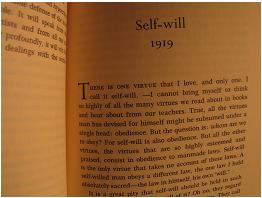How lovely it is to cross such a boundary. The wandering man becomes a primitive man in so many ways, in the same way that the nomad is more primitive than the farmer. But the longing to get on the other side of everything already settled, this makes me, and everybody like me, a road sign to the future. If there were many other people who loathed the borders between countries as I do, then there would be no more wars and blockades. Nothing on earth is more disgusting, more contemptible than borders. They're like cannons, like generals: as long as peace, loving kindness and peace go on, nobody pays any attention to them - but as soon as war and insanity appear, they become urgent and sacred. While the war went on, how they were pain and prison to us wanderers. Devil take them!
But I smile, and not only with my mouth. I smile with my soul, with my eyes, with my whole skin, and I offer these countrysides, whose fragrances drift up to me, different senses than those I had before, more delicate, more silent, more finely honed, better practiced, and more grateful. Everything belongs to me more than ever before, it speaks to me more richly and with hundreds of nuances. My yearning no longer paints dreamy colors across the veiled distances, my eyes are satisfied with what exists, because they have learned to see. The world has become lovelier than before.
The world has become lovelier. I am alone, and I don't suffer from my loneliness. I don't want life to be anything other than what it is. I am ready to let myself be baked in the sun till I am done. I am eager to ripen. I am ready to die, ready to be born again.
The world has become lovelier.
I feel life trembling within me, in my tongue, on the soles of my feet, in my desire or my suffering. I want my soul to be a wandering thing, able to move back into a hundred forms. I want to dream myself into priests and wanderers, female cooks and murderers, children and animals, and, more than anything else, birds and trees; that is necessary, I want it, I need it so I can go on living, and if sometime I were to lose these possibilities and be caught in so-called reality, then I would rather die.
Trees are sanctuaries. Whoever knows how to speak to them, whoever knows how to listen to them, can learn the truth. They do not preach learning and precepts, they preach, undeterred by particulars, the ancient law of life.
A tree says: A kernel is hidden in me, a spark, a thought, I am life from eternal life. The attempt and the risk that the eternal mother took with me is unique, unique the form and veins of my skin, unique the smallest play of leaves in my branches and the smallest scar on my bark. I was made to form and reveal the eternal in my smallest special detail.
A tree says: my strength is trust. I know nothing about my fathers, I know nothing about the thousand children that every year spring out of me. I live out of the secret of my seed to the very end, and I care for nothing else. I trust that God is in me. I trust that my labor is holy. Out of this trust I must live.
When we are stricken and cannot bear our lives any longer, then a tree has something to say to us: But still! Be still! Look at me! Life is not easy, life is not difficult. Those are childish thoughts. Let God speak within you, and your thoughts will grow silent. You are anxious because your path leads away from mother and home. But every step and every day lead you back again to the mother. Home is neither here nor there. Home is within you, or home is nowhere at all.
Wandering
Luck has nothing to do with rationality or morality; by its nature it has about it a quality akin to magic; belonging to a primitive, more youthful stage of mankind's history. The lucky innocent, showered with gifts by the fairies, pampered by the Gods, is not the object of rational study, and hence not a fit subject for biographical analysis; he is a symbol who always stands outside the personal and historical realms. Nevertheless, there are outstanding men with whose lives "luck" is intimately bound up, even though that luck may consist merely in the fact that they and the task proper to their talents actually intersect on the plane of history and biography, that they are born neither too soon nor too late.
The Glass Bead Game
